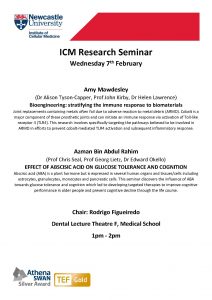PP_GIP_GBR_2956ASPIRE2018_Final V2.0_11Jan18 – GBR
18875 FWIS 2018 200×200 flyer
Pfizer Opens a Unique Call for Important Clinical Research – Patients First Inflammation ASPIRE 2018
https://www.aspireresearch.org/
The Inflammation ASPIRE research grant programme has been proudly supported by Pfizer for five years, giving investigators an opportunity to further advance their research.
Open to investigators throughout wider Europe, Israel, Turkey, Russia, Australia, New Zealand, Japan and South Korea.
- The effect of inhibition of the JAK–STAT pathway by targeting JAK on specific clinical effects, looking at efficacy and/or safety outcomes in rheumatoid arthritis (RA), ulcerative colitis (UC) and psoriatic arthritis (PsA)
- The role of the JAK–STAT pathway in inflammation in PsA
The ASPIRE programme places patients at the forefront of clinical investigations. The translational potential of research into clinical practice within a short timeframe has always been considered paramount. It is for this reason Pfizer has encouraged investigators to apply for the programme over the years and will continue to support this vision.
The Pfizer Inflammation ASPIRE programme is designed to advance clinical and scientific research and generate data that will help inform clinical practice and treatment decisions in rheumatoid arthritis (RA), psoriatic arthritis (PsA) and ulcerative colitis (UC).
We are proud to announce that ASPIRE 2018 will be a special programme with increased funding available for all three therapy areas. This opportunity will allow investigators to conduct clinically relevant investigations, providing an enhanced understanding of the disease area with potential benefits translated into clinical management.
Advances in science and medicine should translate into tangible clinical benefit in the short and long term. With this in mind, proposals should aim to describe the clinical value, the proposed research and its outcomes will add to patients’ lives. Innovative patient approaches in research design and/or research leading to tangible positive outcomes for patients will be prioritised.
Rheumatology
- Treatment Optimisation in Rheumatoid Arthritis
- Treatment strategies in RA patients in sustained remission whilst on JAK inhibitor treatment
- Optimisation of management of RA patients, treated with JAK inhibitors, such as, but not limited
- to, monotherapy, concomitant treatment tapering or withdrawal (glucocorticoids, csDMARDs)
- Management of JAK inhibitor treatment in patients with co-morbidities, such as (but not limited
- to) infections (herpes zoster [HZ], other), interstitial lung disease
- HZ immunisation prior to JAK inhibitor treatment
- Impact of JAK inhibitor treatment on pain (CNS/peripheral)
- Assessment of adherence and compliance in patients treated with JAK inhibitors
- Role of JAK pathway in Psoriatic Arthritis & Impact of JAK Inhibition on a Broad Range of Clinical
Outcomes
- The role of the JAK pathway in the pathophysiology and immunology of PsA
- The role of JAK–STAT inhibition with respect to pain and fatigue
- Effect of JAK–STAT inhibition on dactylitis and/or enthesitis
- Mechanistic understanding of JAK-STAT signalling on structural progression
- PP-XEL-EUR-0964 2
- Effect of JAK-STAT inhibition as monotherapy
Inflammatory Bowel Disease
Enhancing the Understanding of the Clinical Profile of JAK Inhibitors in the Treatment of UC Patients*
- Management of the risk of HZ with vaccination in UC patients treated with JAK inhibitors
- Evaluation of lipid elevations with JAK inhibitors in UC patients, including the MOA of such
-
- potential effects
- Effect of JAK inhibitors on extra-intestinal manifestations in UC patients
- Effects of JAK inhibitors on hospitalisation and surgery rate, their respective causes and postsurgery
- complications
- Evaluation of risk for adenoma/dysplasia/colon cancer rate of patients treated with JAK
- inhibitors
- *Strong preference will be given to studies that utilise the ECCO UR-CARE platform for capturing IBD patients’ records.
Awards will be made by an independent committee according to the scientific value of each proposal.
Funding in RA will vary depending on the research question.
However, the programme will include awards of up to 1,500,000 – 2,000,000 Euros for multicentre, multi-national clinical studies for exceptional proposals (1-2 proposals). Smaller grants are also available for investigators wishing to pursue smaller scale projects.
Funding in PsA and UC will also depend on the research question, with maximum awards of up to 200,000 Euros for clinical proposals and up to 80,000 Euros for translational research in PsA.
APPLICATION DEADLINE: March 23rd 2018
Pfizer looks forward to the Inflammation ASPIRE 2018 Research Awards becoming even more successful in 2018 with this unique call.

